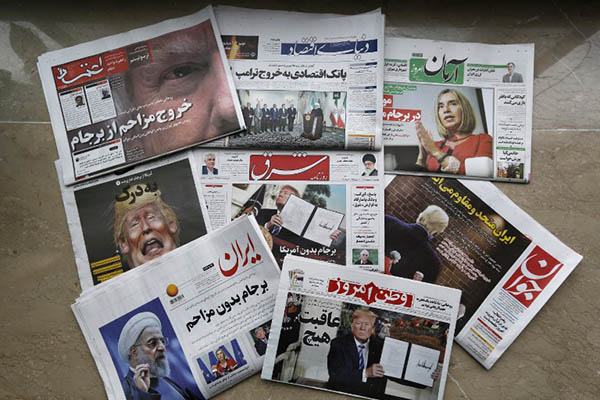
Atta Kenare—AFP
Trump exit from Iran nuclear deal provokes new dynamic that heightens fears of conflict across Middle East
U.S. President Donald Trump’s rejection of an accord curbing Iran’s nuclear activities and the escalation in hostilities between Iran and Israel that followed herald a new strategic dynamic in the Middle East that has heightened fears of greater conflict.
While Europe is leading efforts to save the nuclear deal with Tehran, Iran’s regional rivals Israel and Saudi Arabia both are behind Washington. “The result is a coalition that rather goes against their nature,” said Denis Bauchard, Middle East expert at the French Institute of International Relations (Ifri) in Paris.
As well as abandoning the nuclear agreement, Trump has controversially decided to move the U.S. embassy from Tel Aviv to Jerusalem—a nod to Israel and an affront to Palestinians who claim part of the contested city.
“Trump has decided to give complete, unreserved satisfaction to the Israelis,” said Agnes Levallois, vice-president of the Mediterranean and Middle East research institute IREMMO.
Israel launched strikes against Iranian targets in Syria on Thursday, alleging that Iranians had fired rockets at its positions. Iran denied the claim. Any such action by Iran is a red line for Israel—and therefore for Washington too.
Saudi Crown Prince Mohammed bin Salman, for his part, wants his country to play a major role in the Gulf region and beyond. He does not wish to see Tehran muscle in, says Hasni Abidi, director of the Study and Research Center for the Arab and Mediterranean World (CERMAM) in Geneva.
Joining Trump in denouncing an accord that limited Tehran’s nuclear ambitions in exchange for sanctions relief was essential for Riyadh, Abidi said. The lifting of economic sanctions under the deal was designed to boost the Iranian economy, allowing the country “to flourish on the regional and international stage,” prompting Saudi concern.
Israel meanwhile said the accord failed to guarantee that Tehran would not ultimately develop nuclear weapons, having spent recent years developing a ballistic missiles program. Defenders of the accord insisted it could keep Iran’s nuclear ambitions under wraps in the medium term.
Israel’s strikes on Thursday sent a message to Tehran, says Levallois: “Now go home, desist from being [militarily] present in different theaters and in particular on the border with Israel.”
The timing of the Israeli strikes, two days after Trump’s announcement that he was abandoning the nuclear accord, was telling. “The Israelis have chosen this moment to strike as they know Iran cannot respond militarily if it insists on saving an accord, which for it, is very important both in economic and political terms,” said Abidi.
Under Trump, the U.S. approach moves away from multilateral diplomacy encouraging instead the “use of force or the threat of it,” in the region, notably from Israel.
French presidential officials say Iranian President Hassan Rouhani has called on European signatories to help keep the deal afloat. In a phone call on Wednesday, French President Emmanuel Macron told Rouhani, however, that Paris ultimately wants to see an expanded accord dealing with Iran’s ballistic missile development and its involvement in several Mideast crises.
German Chancellor Angela Merkel warned Thursday of the threat of a potential slide toward outright conflict in the Middle East.
Abidi believes neither Israel nor Iran want war. Bauchard said Iran would exercise a “certain prudence to avoid an escalation which they could not counter.”
Levallois says that while the situation could degenerate, “I do not think the Iranians will run the risk of entering a military confrontation with Israel as they know full well they would not win.”
Even so, an escalation could result if the accord putting Iran’s nuclear ambitions on hold for at least a decade becomes moribund. One French diplomat warns that “If Iran had nuclear weapons it is clear that could unleash a major proliferation crisis … opening a Pandora’s box.”
Such a scenario is not one Saudi Arabia and Israel would allow unchallenged.
